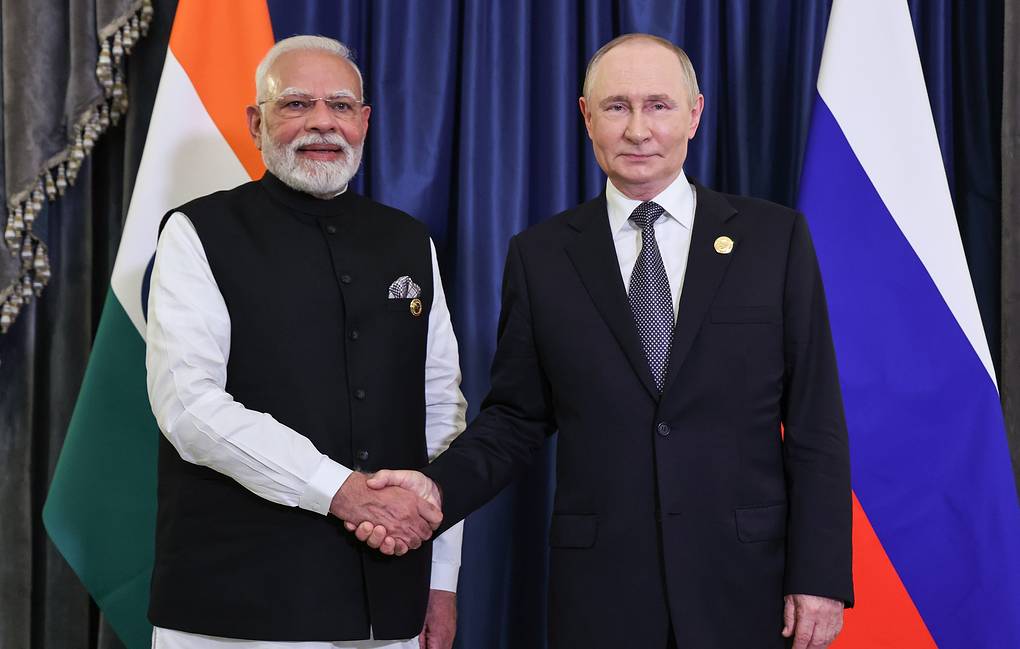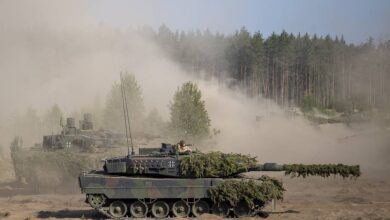Press review: Russia boosts India ties while political disputes hit green transition
Top stories from the Russian press on Tuesday, November 11th Prime Minister of India Narendra Modi and Russian President Vladimir Putin
Prime Minister of India Narendra Modi and Russian President Vladimir Putin
MOSCOW, November 11. /TASS/. Russia-US talks on normalizing relations remain on hold; Moscow gears up to strengthen ties with New Delhi ahead of Vladimir Putin’s visit to India; and political disputes may complicate decision-making at the COP30 summit. These stories topped Tuesday’s newspaper headlines across Russia.
Izvestia: Russia-US talks on normalizing relations remain on hold
Russia-US dialogue on irritants in bilateral relations remains stalled. There are currently no plans for the next round of talks on resuming the operation of the embassies in Moscow and Washington, a spokesperson for the US diplomatic mission told Izvestia. Experts are certain that only progress in resolving the Ukraine conflict can restart dialogue between the two countries.
It has been clear for a while that dialogue is not proceeding smoothly. The second and so far the last round was held more than six months ago. Notably, the consultations were taking place almost in parallel to the February and March talks on settling the Ukrainian conflict. The lack of progress on one of the tracks clearly influenced the other. Improving relations between Russia and the United States requires efforts to resolve the Ukraine crisis to move forward, Pavel Sharikov, senior researcher with the Department of European Integration Studies at the Russian Academy of Sciences' Institute of Europe, pointed out.
Meanwhile, it’s not the Ukraine issue that is currently the focus of Russia-US dialogue. US President Donald Trump has recently surprised the world by deciding to resume nuclear testing after a 30-year hiatus. Russia’s tests of the Oreshnik, Burevestnik and Poseidon delivery systems and Trump’s statements have once again turned nuclear weapons into one of the main topics on the global agenda, unseen since the end of the Cold War, Peter Kuznick, director of the Nuclear Studies Institute at American University in Washington, D.C., noted.
"Russia-US talks have clearly been put on hold for now as the positions of the parties have sharply diverged. The current agenda includes efforts to consolidate achievements on the battlefield and boost military buildup," said Georgy Asatryan, deputy director of the Institute for Global Military Economics and Strategy at Higher School of Economics and Russian International Affairs Council expert.
However, this doesn't mean that there will be no more talks. It seems that Donald Trump and his team haven’t yet grasped the depth and underlying causes of the conflict that Russia has repeatedly pointed to. It’s a systemic problem, which primarily concerns Russia’s security, the expert emphasized. This is one of the reasons why the nuclear issue has taken center stage, pushing other aspects of bilateral relations into the background.
Vedomosti: Russia prepares to boost ties with India
Moscow and New Delhi are working to strengthen cooperation in several fields ahead of Russian President Vladimir Putin’s visit to India, which, according to Indian media, will take place on December 5-6. The officially confirmed topics on the agenda include energy and defense cooperation, Vedomosti reports.
India’s business newspaper The Economic Times reported that the two countries might sign a new agreement on protecting the rights of Indian workers during Putin’s visit, which could expand the number of Indians working in Russia in the coming years. Workers from visa-requiring countries, which include India, come to Russia based on a quota mechanism. In July, the Russian Ministry of Labor said that the quota for Indian citizens amounted to over 70,000. According to The Economic Times, Indian workers largely find employment in areas such as construction and the textile industry. However, people familiar with the situation point out that demand is also rising for skilled workers in the fields of mechanical engineering and electronics.
India is not only the world’s most populous country but also a leader in terms of labor exports as it has for a while been providing workforce to the Gulf nations, Malaysia, the United States, and Europe, with the trend coming to Russia only recently, said Maxim Yemelyanov, director general of the Trudorgnabor company recruiting foreign personnel. Indian citizens work at garment factories that fulfill the state defense order, and they are also enlisted to work in the agriculture and construction sectors, the expert noted.
Cooperation in labor migration between the two countries is expected to grow in the near future, Gleb Makarevich, researcher at the Center for Indo-Pacific Studies under the Russian Academy of Sciences’ Institute of World Economy and International Relations, believes.
Besides, Russia’s government commission on legislative activity has approved amendments to an intergovernmental agreement broadening defense cooperation with India, two sources told Vedomosti. The bill provides for the ratification of an agreement that the two countries signed on February 18, 2025, said Vladimir Gruzdev, chairman of the board at the Association of Lawyers of Russia. The document particularly increases the size of troops and equipment involved in joint exercises and activities, a source close to the Russian Defense Ministry specified.
Media: Political controversies may complicate green transition
Participants in the 2025 United Nations Climate Change Conference (COP30), which is underway in Brazil, are looking for ways to resolve issues related to climate change, the transition to renewable energy and funding for these measures. The conference has just begun, but concerns are already emerging about the parties’ ability to agree on a collective response to climate change. One of the reasons behind the worry is that the United States, which is among the countries with the largest carbon emissions, declined to participate, Izvestia notes.
"Without Washington, global decarbonization efforts are unlikely to be successful because the US is the second largest source of carbon dioxide emissions in the world. The previous Trump administration sent a delegation to the COP meeting in 2018, but this time, no high-ranking US official will be attending the conference," Yevgeniya Prokopchuk, analyst with the Center for Comprehensive European and International Studies at the Higher School of Economics, elaborated.
Disagreements within the European Union are another factor that hinders joint decisions. Although the EU positions itself as the leader of green policy, some member states aren’t ready to accept plans to reduce emissions due to their economic interests. It’s also difficult to make decisions because of differing approaches to climate policy, Yelena Maslova, senior researcher at the Russian Academy of Sciences’ Institute of Europe, explained. "Brussels seeks to carry out reforms to turn the economy green, while Russia’s approach is more focused on the so-called mitigation strategy, aimed at reducing the consequences that could result in climate warming," she specified.
What also complicates joint decisions is the escalating conflict between the Global North and the Global South, which involves both geopolitical difficulties and environmental issues.
Alexey Kokorin, climate change expert at the Nature and People foundation, explained to Kommersant that the core conflict issues were still related to climate funding, with many nations in the Global South insisting that most of the money should come from the budgets of the developed countries in the Global North. "Meanwhile, Russia is not involved in these financial disputes because our country is neither a recipient nor a contributor of climate funding," Kokorin added.
Media: Zelensky losing ground amid corruption scandals
Vladimir Zelensky is losing support amid his conflict with Ukraine's anti-corruption agencies, said experts interviewed by Izvestia. Businessman Timur Mindich, who is close to the country’s authorities, left Ukraine a few hours before officials from the National Anti-Corruption Bureau (NABU) came to search his premises. Some say that NABU is in fact controlled by the United States, and Washington is now preparing the stage for appointing a new president in Ukraine.
"NABU personnel largely consist of US henchmen. I believe that the Mindich incident is the tip of the iceberg and a serious message to Zelensky from the United States to stop stealing. It’s possible that the US is currently seeking candidates for president," said Roman Kovalenko, chairman of the executive committee of the Other Ukraine international movement.
NABU carries out corruption investigations in order to put pressure on Ukraine’s political leadership, political scientist Alexander Nemtsev told Vedomosti. Initially, anti-corruption agencies were created by Western nations as part of the country’s external oversight, and now, they seek to use these institutions either to dismantle the current Ukrainian political regime or push Kiev to take unpopular measures, which could also be related to the Ukraine-Russia conflict, the expert suggested.
Meanwhile, the scandal is providing strong evidence to Europe’s right-wing anti-globalist forces who seek to strengthen their propaganda at home to end military and financial assistance to Ukraine. Still, the expert ruled out that the European Union will stop the flow of aid to Kiev as he believes European elites are also closely connected to Ukrainian corruption.
However, Vladimir Zharikhin, deputy director of Russia’s Institute of CIS Countries, believes that the scandal around the anti-corruption probe will not significantly impact Zelensky's political survival because Ukraine is unlikely to hold elections as long as fighting continues, and a change of government is only possible through a military or paramilitary coup.
Izvestia: Europe continues to purchase Russian gas before banning supplies
The Greek prime minister has called for a ban on Russian gas supplies to the European Union, including via the TurkStream pipeline. In general, EU countries plan to prohibit the import of all types of Russian gas starting on January 1, 2028. Meanwhile, Russian gas exports to European states through TurkStream hit record levels in October, Izvestia writes.
AMarkets leading analyst Igor Rastorguyev points out that the European Union’s plan to completely abandon Russian liquefied natural gas by 2028 will primarily create difficulties for the Europeans. "The ban will formally take effect in January 2026 but a transition period will continue until the middle of 2026 for short-term contracts and until the beginning of 2028 for long-term ones. What is important is that the document includes a mechanism for a temporary suspension of restrictions in the event of issues related to the security of supplies," the expert said.
The analyst doubts that the plan is realistic. "The EU imported 4.5 billion euros worth of Russian LNG in the first six months of 2025, which was 29% more than the year before. Europe continues to actively purchase our gas simply because it is more cost-effective compared to alternatives," the specialist explained.
Rastorguyev noted that Moscow was consistently expanding sales markets. China has become the largest buyer of Russian pipeline gas. "Add India, Turkey, and Central Asian nations, where energy demand is growing, while Europe keeps reducing industrial production," the analyst observed.
Yelena Panina, director of the Institute for International Political and Economic Strategies, believes that the European Union’s move to abandon energy cooperation with Russia will lead to a decline of Europe's industries and a loss of competitiveness. "Meanwhile, the situation is strengthening China as it is gaining increasing access to Russian energy," the political scientist stressed. In her view, without access to Russian natural resources, Europe is doomed to turn into a global outsider and lose its privileged position.

